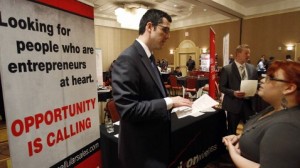The State Department might sound like a strange place for the President’s Council on Jobs and Competitiveness to hold a listening session with the heads of foreign companies that invest in the United States, but hearing their comments it all made sense.
The business executives said they want to invest more in the United States, but cited ongoing concerns about weak U.S. infrastructure, their difficulties in finding a skilled workforce and resolving issues with visas for their employees.
“The issue that we have is finding skilled workers,” said Christian Turnig from ThyssenKrupp, a German company.
According to Turnig, his company had to send hundreds of employees from its new plant in Alabama to Germany for several months of training. He said his company would have preferred to do the training in the United States, but it was unable to get visas for their German employees to enter the U.S.
Sitting beside Jeffrey Immelt, CEO and chairman of General Electric, who is also the chairman of the president’s jobs council, Secretary of State Hillary Clinton listened throughout much of the hour-long session and pledged to provide the resources of her department to address their concerns.
She said the State Department was making progress on visa issues through increased access and hours, despite legislative limitations and potential budget cutbacks that could make the situation more difficult.
“We’re in a race; we want to increase access to this country,” she said. “We’re particularly interested in the business ramifications. So we very much welcome the jobs council emphasis on this.”
Martin Daum, the head of Daimler Trucks North America, told the gathering that he felt he had better skilled workers at his plants in Mexico than in the United States, where some workers have to be taught proper math and writing skills.
He said that America produces highly educated professionals, but knowledge can be lacking when it comes to hiring for vocational jobs. According to Daum, the better skill sets of Mexican workers makes it easier to ramp up production at his company’s factories in Mexico than those in the United States.
“We have to bring in educators,” he said.
Peter Solmssen of Siemens said his company was “bullish on America. We have 3,000 open jobs and we’re looking for people to come work for us.”
But he added there were bumps in the road, “it’s a skills issue. We’re having to train them ourselves. ”
Clinton’s strongest comments were about how vocational training programs have been cut in recent years and that the perceptions of blue-collar jobs in this country have to change.
“We need to pay more respect to those men and women who do this work,” she said. “We’ve had, for a long time, a mixed message: Go to college, go to college, get a degree and make that kind of money,” which has devalued blue collar job opportunities.
She added that a strong public message needs to remind Americans that “that these are good jobs – $77,000 a year. These are good jobs and the people who do them are good, smart, hardworking people, and we need to support them.
She said such a campaign would raise the respect “for these jobs and [which] the people doing them deserve to have, which in our country is not on the equivalent as we see in other countries that we’re competing with.”
Luiz Martinez 07th October 2011
http://abcnews.go.com/blogs/politics/2011/10/foreign-ceos-hard-to-find-skilled-us-workers/




Foreign CEOs: Hard to Find Skilled US Workers
Posted on October 8, 2011